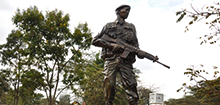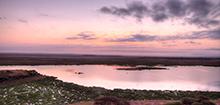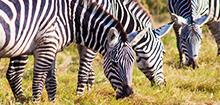Mount Marsabit Forest
Mount Marsabit is a cloud forest that it is shrouded in mist and fog, high moisture levels and cool year temperatures. The forest is of critical importance to sustaining life not only within the forest, but also in the surrounding areas including Marsabit town. The forest and the surrounding areas harbour a diverse range of ecosystems and associated biodiversity. Its ecosystem service functions (water provision, climate regulatory, carbon storage roles) and good provision (fuel wood, grazing, medicinal plants) are particularly important to the people living in the area.
Forest destruction
There are 11,000ha of Marsabit forest remaining (down from over 18,363ha in 1973). The rate of deforestation is estimated to be 180 ha per year. The primary drivers of deforestation are:
i) Conversion of forest to agricultural land (particularly to the east of the forest).
ii) Deforestation through over abstraction of fuel wood.
iii) Over-grazing by domestic livestock. It is with the desire to intervene and reverse this vicious degradation cycle that the Northern Kenya Biodiversity Conservation Project (Marsabit) was conceived and formulated by the Government of Kenya (GOK).
Project Goal
The overall goal of the project is to achieve sustainable use of natural resources while at the same time optimizing ecological service functions, particularly water, grazing and energy provision in Marsabit forest and its ecological and economic connections.
Implementation Approach
This goal will be specifically achieved through a network of protected areas and community conservancies that are managed effectively, adaptively and collaboratively through partnerships that include government, non-government actors, and local communities.
Project Area
The project will focus on the remnant forest on Mt. Marsabit and its economic and biological connections. Therefore the main activities will take place in and surrounding the Marsabit Forest



Project Period
Funds Outline
The total cost of the project is KES 1.26 billion (€ 12.64 million) and the project will last five years. Co-finance is provided by GoK, TNC and NRT as tabulated below;
No. | Item | Amount (€,million) | Remarks |
1. | Government of Kenya | 2.41 | Gok Contribution |
2. | French Development Agency (AFD) | 8.00 | Loan Component |
3. | FFEM (French Global Environment Facility) | 1.50 | Grant Component |
4. | The Nature Conservancy (TNC) | 0.44 | TNC contribution |
5. | Northern Rangeland Trust (NRT) | 0.29 | NRT contribution |
| Total Project Cost | 12.64 | |
Project Components
The project will adopt five principal components in order to contribute to achieving its goal. These are:
- The enabling policy and legislative framework for conservation in Kenya is implemented in northern Kenya, and institutional cooperation, collaboration and coordination leads to effective conservation and natural resource agreement.
- The critical ecosystem service functions of Marsabit forest are secured while alternative sources of energy, water and grazing sought developed and managed.
- The biological and economic connections between Marsabit and its surrounding areas are secured and thereafter maintained.
- Payment for Ecosystem Services (PES) is generating revenues that are contributing to covering of conservation and socio-economic well being.
Policy and legislative framework
- Gazettement of the Marsabit national park
- Signing of MoUs with various stakeholders
- Developing a joint management plan for the Marsabit park and forest reserve
- Developing Conservancies management plans for Songa, Shurr and Jaldesa conservancies
- Developing a Tourism development plan for the Nothern circuit.
Ecosystem conservation
- Infrastructure development
- Development of Tourism Facilities
- Construction of Offices and housing for staff
- Vehicles procurement
- Establishment of Songa, Shurr and Jaldesa community conservancies
- Support Research activities
Natural resource management
- Development of Natural resources agreements
- Reforestation & Woodlots development
- Promoting grazing management plans and reseeding pilots
- Promoting alternative source of energy and Livelihood
Payment for Ecosystem services
- Exploring Carbon trading opportunities
- Development of Water users agreements
- Exploring of opportunities for Tourism contributing to local livelihoods.
Connectivity
- Security assessment and improvement of security along wildlife corridors
Project Stakeholders
The key stakeholders include:
- The Ministry of Environment, Water, and Natural resources (MEW&NR)
- The Kenya Wildlife Service
- The Kenya Forestry Service
- The Nature Conservancy (TNC)
- The Northern Rangelands Trust (NRT)
- Marsabit town community.
- Shura, Songa and Jaldesa communities
- Namunyak Community
- Marsabit and Samburu County Governments
- Provincial Administration
- The NGOs
- Donors (AFD, FFED,TNC & GoK,)
- National Environment Management Authority
Project Beneficiaries
- People living in Marsabit town and areas surrounding the Marsabit National Reserve.
- Communities in three community conservancies, (Songa, Shura and Jaldesa
- Institutions involved in Natural Resource management and Conservation
Implementing Agencies
- The lead agency for project implementation is Kenya Wildlife Service (KWS) for the Loan component
- Northern Rangeland Trust (NRT) takes the lead in implementing the Grant component
Project Implementation Structures
- A Project Steering Committee (PSC, chaired by the Ministry of Forestry and Wildlife) responsible for is to provide overall oversight to the project, to ensure that it proceeds in a timely and satisfactory fashion.
- A locally based Project Management Committee (PMC, chaired by KWS’s AD-Northern Conservation Areas) responsible for giving oversight and guidance to the Project Implementation Unit (PIU) to ensure that the project is implemented in a satisfactory way.
- A Project Implementation Unit (PIU, headed by a Project Coordinator) responsible for oversight and implementation of the project on a day to day basis.
CONTACT DETAILS
Northern Kenya Biodiversity Conservation Project (Marsabit)
Mt. Marsabit National Park P.O. Box
Box 42, Marsabit, Kenya.
Cell No: 0725333121








